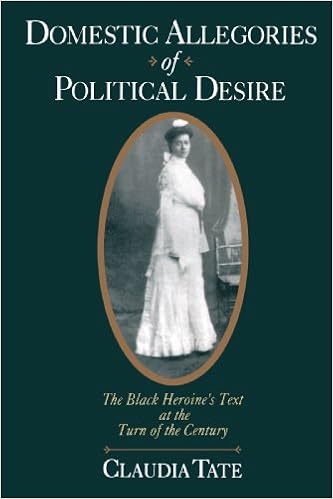
By Claudia Tate
Why did African-American girls novelists use idealized tales of bourgeois courtship and marriage to mount arguments on social reform over the past decade of the 19th century, in the course of a time whilst resurgent racism conditioned the lives of all black americans? Such tales now look like apolitical fantasies to modern readers. this can be the query on the heart of Tate's exam of the novels of Pauline Hopkins, Emma Kelley, Amelia Johnson, Katherine Tillman, and Frances Harper. Domestic Allegories of Political Desire is greater than a literary examine; it's also a social and highbrow history--a cultural critique of a interval that historian Rayford W. Logan referred to as "the darkish a long time of modern American history." opposed to a wealthy contextual framework, extending from abolitionist protest to the Black Aesthetic, Tate argues that the idealized marriage plot in those novels doesn't only depict the heroine's happiness and financial prosperity. extra importantly, that plot encodes a resonant cultural narrative--a household allegory--about the political objectives of an emancipated humans. as soon as this household allegory of political hope is unmasked in those novels, it may be visible as an important discourse of the post-Reconstruction period for representing African-Americans' collective goals approximately freedom and for reconstructing these contested desires into consummations of civil liberty.
Read Online or Download Domestic Allegories of Political Desire: The Black Heroine's Text at the Turn of the Century PDF
Similar African American books
'Til Death Or Distance Do Us Part: Love and Marriage in African America
Traditional knowledge tells us that marriage was once unlawful for African american citizens through the antebellum period, and that if humans married in any respect, their vows have been tenuous ones: "until demise or distance do us half. " it really is an impact that imbues ideals approximately black households to today. yet it is a conception based mostly on files produced through abolitionists, the country, or different partisans.
Female Subjectivity in African American Women's Narratives of Enslavement: Beyond Borders
In a transparent and obtainable type, this e-book theorizes girl move inside narratives of enslavement and advocates for a replaced black woman attention.
The determine of the violent guy within the African American mind's eye has a protracted historical past. He are available in 19th-century undesirable guy ballads like "Stagolee" and "John Hardy," in addition to within the black convict recitations that stimulated "gangsta" rap. "Born in a amazing undesirable Land" connects this determine with comparable characters in African American fiction.
Additional info for Domestic Allegories of Political Desire: The Black Heroine's Text at the Turn of the Century
.jpg)


